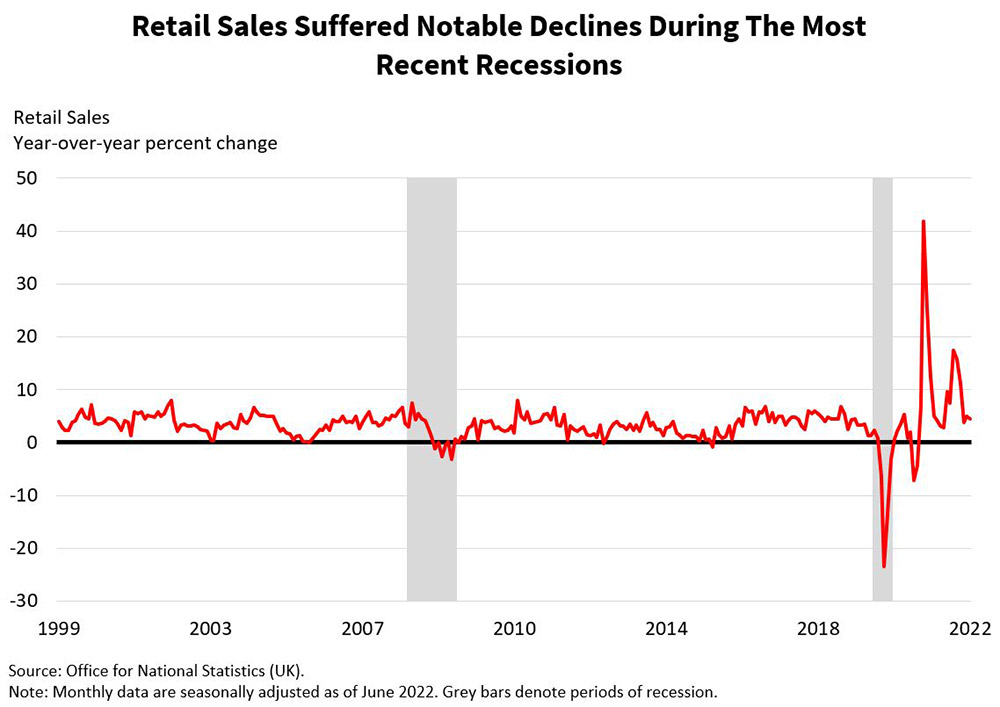Study Notes:
Jose Torres for Interactive Brokers, in this lesson I’ll be explaining one of the leading economic indicators of the United Kingdom’s economy: Retail Sales.
The Retail Sales report tracks value and volume changes in retail transactions on a monthly basis. It gives information on sales activities throughout many kinds of business establishments. Predominantly food stores, non-specialized stores, textile, clothing and footwear stores, household goods stores, other non-food stores, non-store retailing and automotive fuel are the seven major sectors covered. Each sector has sub-sectors as well for increased granularity. For example, furniture and electrical appliances are reported separately within the household goods sector. Seasonal factors, such as vacations in the summers or retail expenditures around the holidays, are taken into account when reporting sales numbers. Also, value and volume changes are reported excluding automotive fuel due to its volatile traits. The data is generally collected from 5,500 retailers through surveys conducted via email and telephone. The Retail Sales data release is published by the Office for National Statistics near the 20th day of each month at 7:00am London time. The Office for National Statistics publishes retail sales information and a wide variety of other statistics to serve the public good.
Economic conditions are strongly influenced by retail sales. Sales demonstrate how consumers act and think in the context of a dynamic economy. Like in most parts of the world, domestic consumers in the United Kingdom play a significant role in the expansion of the economy by spending money that benefits companies, workers and governments through income. Moreover, a part of the Bank of England’s economic analysis involves using retail sales data to monitor and guide monetary policy.
Strong retail sales readings reveal continued purchases of goods and services by consumers which indicate optimistic sentiment about the economy. If the readings are relatively lower, this may indicate consumer concern and a potential slowdown in the economy. Revenues, profits, and employment all increase when retail trade is robust, which strengthens the economy and puts people, businesses and governments in a better financial position. Consequently, this leads to boosts in business investment, more lending activity, more tax revenue for governing authorities and loftier GDP levels. Because of its interdependence and the Group of Seven’s significant influence, the global economy suffers when retail sales decrease in the UK, as it did during the 2008 financial crisis and the COVID-19 recession.
 Retail sales can be forecasted by using multiple leading economic indicators. By evaluating business and consumer confidence indicators, we track how consumers and businesses feel about economic prospects in the present and future. As consumer mobility correlates positively with stronger retail activity, foot traffic, air passenger levels, and fuel sales are important data points. Employment, unemployment, and income indicates if consumer pockets may suffer as a result of a worsening labor market which leads to weaker transaction activity. In search of indications of a consumer slowdown or expansion, we would listen to the earnings calls and track the stock performance of some of the most influential publicly traded corporations.
Retail sales can be forecasted by using multiple leading economic indicators. By evaluating business and consumer confidence indicators, we track how consumers and businesses feel about economic prospects in the present and future. As consumer mobility correlates positively with stronger retail activity, foot traffic, air passenger levels, and fuel sales are important data points. Employment, unemployment, and income indicates if consumer pockets may suffer as a result of a worsening labor market which leads to weaker transaction activity. In search of indications of a consumer slowdown or expansion, we would listen to the earnings calls and track the stock performance of some of the most influential publicly traded corporations.
Durable goods including automobiles, appliances, and furniture will cost more to obtain when monetary policy becomes tighter and interest rates are rising. It is critical to analyze retail sales statistics in reaction to monetary policy changes. In previous eras, stricter monetary policy has led to softer consumer spending and heightened recession risk.
Retail sales fluctuations are valued by investors and economists on a month to month and year over year basis. Retail sales may drive major market moves since they correlate strongly with company revenues. In the event that retail sales perform worse than expected, markets tend to drop more, while in the event that the data perform better, they tend to leap more. Growing retail transactional streams result in a stronger economy and a more favorable environment for domestic and foreign equities.
A thorough analysis of retail sales is imperative for identifying the pace of growth, or deceleration in the economy.











![[Gamma] Scalping Please [Gamma] Scalping Please](https://ibkrcampus.com/wp-content/smush-webp/2024/04/tir-featured-8-700x394.jpg.webp)



Join The Conversation
If you have a general question, it may already be covered in our FAQs. If you have an account-specific question or concern, please reach out to Client Services.